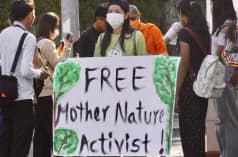The Silence of Pandas – What the WWF Isn't Saying
Nov 28, 2011
The WWF is the largest environmental protection organisation in the world. Trust in its green projects is almost boundless. With rousing campaigns, the WWF directly targets the conscience of its donors. Multinational companies are WWF partners and help to protect the environment. What is behind of all this green propaganda?
The WWF is the largest environmental protection organisation in the world. Trust in its green projects is almost boundless. With rousing campaigns, the WWF directly targets the conscience of its donors - everyone should do their part to save endangered species, the climate and the rainforest. The WWF was founded on September 11, 1961. Today it is the most influential lobby for the environment in the world. Thanks largely to its excellent contacts in both the political and industrial spheres. Behind this eco-facade, the film uncovered explosive stories from all around the world. Stories of displaced peoples, cleared rainforests and the huge money-making industry that is the WWF's green seal of approval. The documentary follows the donations.
In Indonesia, the WWF is fundraising for the threatened orang-utan of Borneo, but on the ground the filmmaker was unable to find a single WWF orang-utan protection project. On the contrary, it found that the WWF is cooperating with a company that is clearing the last forests at the heart of Borneo in order to create palm oil plantations, while the orang-utans keep dying. The WWF takes money from the company in exchange for its quality seal for "sustainable production". Around the world, the WWF is entering into partnerships with huge companies in the fields of energy and agribusiness.
Are WWF deals with industry helping to save the last intact eco-systems in the world or accelerating their destruction?
The 45 minute documentary "The Silence of the Pandas - What the WWF Isn't Saying" has been broadcasted on German public TV channel ARD on 28th of June 2011. The English version can be seen here:
http://www.dailymotion.com/video/x105tsl_wwf-silence-of-the-pandas_news
While indigenous peoples, environmental and human rights groups criticize WWF already for a long time, the film brought the problems with WWF also to the general public. First in Germany and Switzerland, and now to the rest of the world.
This is what Germanwatch writes about the film and reactions. It includes also a translation of an article from one of Germany’s most read and serious newspapers, Süddeutsche Zeitung:
Here you can read what the WWF says about the film: http://wwf.panda.org/wwf_news/press_releases/silence_pact_pandas_wwf.cfm
And last but not least, there is a long list of so called "sustainability labels" founded by WWF. These greenwash label initiatives help the industry to produce more harmful products, and to betray the consumers:
- Palm oil: Roundtable for Sustainable Palm Oil (RSPO)
- (Genetic) soy: Roundtable for Responsible Soy (RTRS)
- (Genetic) cotton: Better Cotton Initiative (BCI)
- Sugar cane: Better Sugar Initiative (BSI)
- Fishing: Marine Stewardship Council (MSC)
- Aquaculture: Aquaculture Stewardship Council (ASC)
- Logging and tree monoculture plantations: Forest Stewardship Council (FSC)
etc.
Read also: Way Beyond Greenwashing: Have Corporations Captured Big Conservation?










